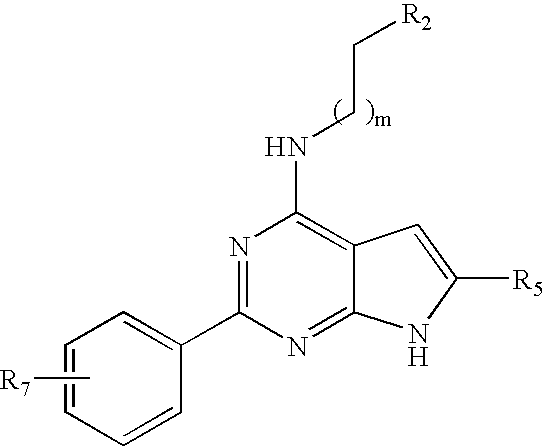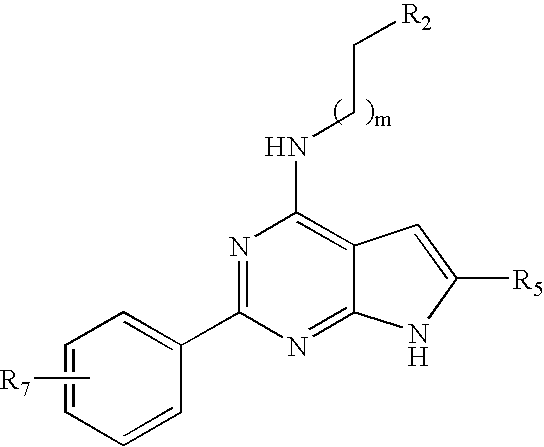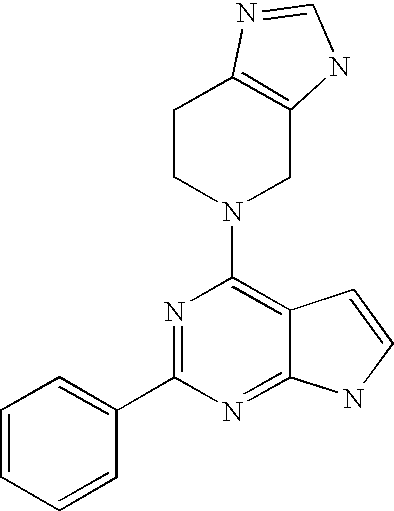Compounds specific to adenosine A1 and A3 receptors and uses thereof
a technology of which is applied in the field of compounds specific to adenosine a1 and a3 receptors, can solve the problem that the shade does not disclose the use of specific asub>3/sub>receptor inhibitors
- Summary
- Abstract
- Description
- Claims
- Application Information
AI Technical Summary
Benefits of technology
Problems solved by technology
Method used
Image
Examples
preparation 1
[0326]A modification of the alkylation method of Seela and Lüpke was used.1 To an ice-cooled (0° C.) solution of ethyl cyanoacetate (6.58 g, 58.1 mmol) in MeOH (20 mL) was slowly added a solution of NaOMe (25% w / v; 58.1 mmol). After 10 min, chloroacetone (5 mL; 62.8 mmol) was slowly added. After 4 h, the solvent was removed. The brown oil was diluted the EtOAc (100 mL) and washed with H2O (100 mL). The organic fraction was dried, filtered, and concentrated to a brown oil (7.79 g; 79%). The oil (3) (Scheme IV) was a mixture of methyl / ethyl ester products (9 / 1), and was used without further purification. 1H NMR (200 MHz, CDCl3) δ—4.24 (q, J=7.2 Hz, OCH2), 3.91 (dd, 1H, J=7.2, 7.0 Hz, CH), 3.62 (s, 3H, OCH3), 3.42 (dd, 1H, J=15.0, 7.1 Hz, 1×CH2); 3.02 (dd, 1H, J=15.0, 7.0 Hz, 1×CH2); 2.44 (s, 3H, CH3), 1.26 (t, J=7.1 Hz, ester-CH3).
[0327]1Seela, F.; Lüpke, U. Chem. Ber. 1977, 110, 1462-1469.
preparation 2
[0328]The procedure of Seela and Lüpke was used.1 Thus, protection of the ketone (3) (Scheme IV; 5.0 g, 32.2 mmol) with ethylene glycol (4 mL, 64.4 mmol) in the presence of TsOH (100 mg) afforded (4) as an oil (Scheme IV; 5.2 g, 81.0) after flash chromatography (SiO2; 3 / 7 EtOAc / Hex, Rf 0.35). Still contains ˜5% ethyl ester: 1H NMR (200 MHz, CDCl3) δ—4.24 (q, J=7.2 Hz, OCH2), 3.98 (s, 4H, 2×acetal-CH2), 3.79 (s, 3H, OCH3), 3.62 (dd, 1H, J=7.2, 7.0 Hz, CH), 2.48 (dd, 1H, J=15.0, 7.1 Hz, 1×CH2), 2.32 (dd, 1H, J=15.0, 7.0 Hz, 1×CH2); 1.35 (s, 3H, CH3), 1.26 (t, J=7.1 Hz, ester-CH3); MS (ES): 200.1 (M++1).
[0329]1Seela, F.; Lüpke, U. Chem. Ber. 1977, 110, 1462-1469.
preparation 3
[0330]A solution of acetal (4) (Scheme IV, 1 g, 5.02 mmol), benzamidine (786 mg, 5.02 mmol), and DBU (1.5 mL, 10.04 mmol) in dry DMF (15 mL) was heated to 85° C. for 15 h. The mixture was diluted with CHCl3 (30 mL) and washed with 0.5 N NaOH (10 mL) and H2O (20 mL). The organic fraction was dried, filtered and concentrated to a brown oil. Flash chromatography (SiO2; 1 / 9 EtOAc / CH2Cl2, Rf 0.35) was attempted, but material crystallized on the column. The silica gel was washed with MeOH. Fractions containing the product (5) (Scheme IV) were concentrated and used without further purification (783 mg, 54.3%): 1H NMR (200 MHz, CDCl3) δ 8.24 (m, 2H, Ar—H), 7.45 (m, 3H, Ar—H), 5.24 (br s, 2H, NH2), 3.98 (s, 4H, 2×acetal-CH2), 3.60-3.15 (m, 2H, CH2), 1.38 (s, 3H, CH3); MS (ES): 288.1 (M++1).
[0331]Preparation of compound (20) (Scheme VIII): A solution of acetal (19) (4.43 g, 20.6 mmol)1, benzamine hydrochloride (3.22 g, 20.6 mmol), and DBU (6.15 mL, 41.2 mmol) in dry DMF (20 mL) was heated to ...
PUM
 Login to View More
Login to View More Abstract
Description
Claims
Application Information
 Login to View More
Login to View More - R&D
- Intellectual Property
- Life Sciences
- Materials
- Tech Scout
- Unparalleled Data Quality
- Higher Quality Content
- 60% Fewer Hallucinations
Browse by: Latest US Patents, China's latest patents, Technical Efficacy Thesaurus, Application Domain, Technology Topic, Popular Technical Reports.
© 2025 PatSnap. All rights reserved.Legal|Privacy policy|Modern Slavery Act Transparency Statement|Sitemap|About US| Contact US: help@patsnap.com



